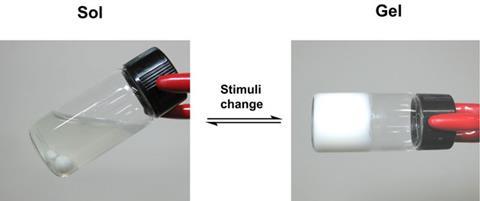Injectable hydrogels with dual ionic properties, biodegradability and low cytotoxicity have been developed by South Korean scientists to deliver proteins therapeutically.
Doo Sung Lee and colleagues from Sungkyunkwan University developed an amphoteric copolymer to form dually cationic and anionic hydrogels, in response to pH and temperature changes. The amphoteric nature of the polymer means it should bind to both cationic and anionic biomolecules, and helps sustained co-delivery of them.

Vitaliy Khutoryanskiy, a pharmaceutical scientist at the University of Reading, UK, believes that the materials could be of potential interest to other areas of drug delivery. ‘A free flowing polymer solution containing a therapeutic agent that can turn into a gel upon administration into the eye could be used for improving bioavailability for ophthalmic drugs,’ he says. ‘However, in this case these materials should ideally form transparent gels and should not cause ocular irritation.’
For now, the hydrogels face other challenges if they are to be seriously considered for future uses in medicinal applications. For example, Lee suggests that the release of biomolecules at desired sites needs to be controlled, the stability of encapsulated molecules needs to be improved for long term use and the biocompatibility of the synthesised materials needs to be enhanced.






No comments yet